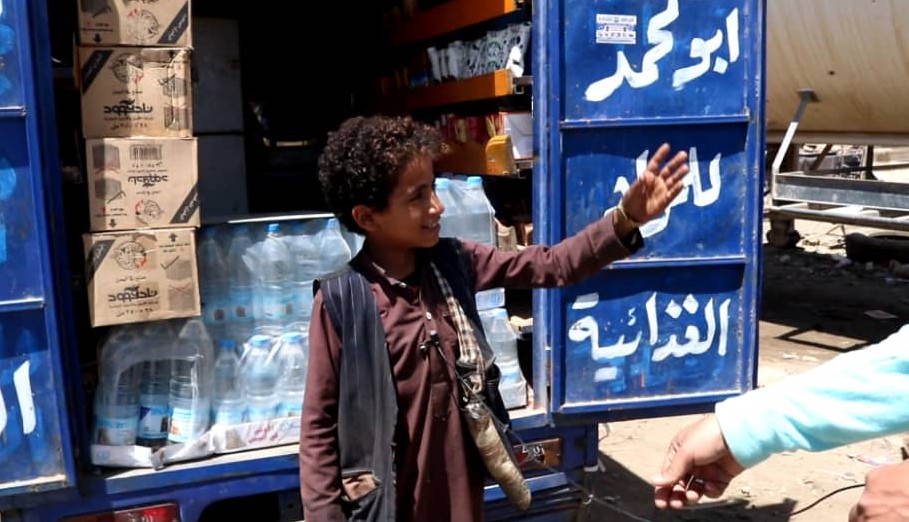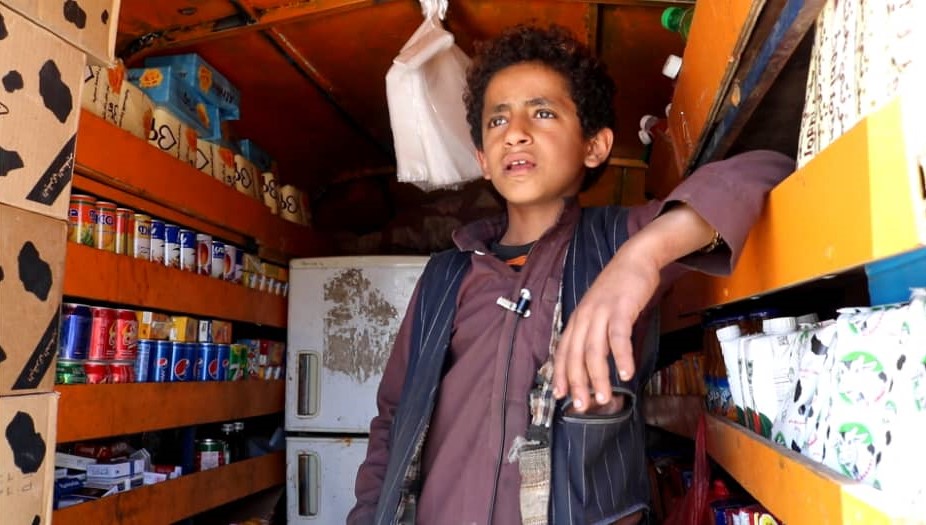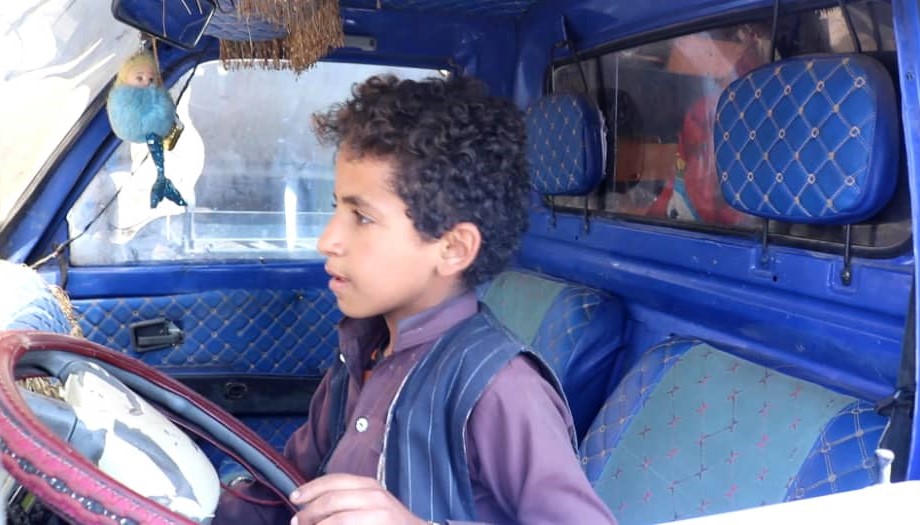The Minibus: A Small Mobile Shop Run by a Yemeni Child

Ishraq al-Attab | Sana’a
At one side of the pavement leading to Jadar district, Sana’a there parks a vehicle. It is open from the behind to perform other than its well-known tasks.
Actually, whenever you pass by it, you find that it contains a lot of light food which can be easily transferred. Inside it stands a child who asks you what you want that he might bring over to you.
Mohamed, the 13-year old child, stands confidently in his small mobile shop to help customers. He has been buying and selling for a year and a half. A lot of pedestrians frequent the shop, for they are amazed by his adeptness, cleverness, and work, in spite of his young age.
Mohamed told Khuyut that he had to work because of his family’s circumstances. His father had become too sick to continue working. So, he decided to start his private trade with the car his father owned and used to drive by himself. Mohamed would buy and deal with vendors by himself.
Mohamed says that the responsibility he bears is more important than studying, though he wishes he could return to school where he was described as a good, clever, and diligent student. However, he left it early to work with his father who has recently stopped working due to his illness which also made him bed-ridden.
Many Yemeni children left school to support their families They are struggling to earn a living , a struggle for survival!
Extensive Damage

The UNICEF, an organization affiliated to the UN and a body concerned with children, categorizes Yemen among the worst countries for children. It estimates that more than two million children have left school, and that 3.7 million children are liable to dropping out of school. The UN organization indicates that the current conflict in Yemen has brought about extensive damage unto the country’s educational system which was initially fragile. It is not possible to use one school out of five because of this conflict.
Mohamed describes his work as difficult. The idea he had initiated to liberate himself from being compelled to rent a place and pay taxes accordingly. This is more than a child at this age can bear. That is why he sells, buys, and arranges goods in his small car. Yet, he complains from the fuel crisis which has affected his work considerably and increased the fees of affording it. Additionally, he has to exert a lot of effort to bring fuel. However, he tries hard and toils to protect his family from poverty.
Pedestrians who pass by the car where Mohamed sells goods are very enthusiastic. Mounir, one of the customers who frequent Mohamed to buy water and juice, says that he is not in favor of children’s labor. Yet, he buys goods from Mohamed to encourage him as long as he works honorably to provide for his family.
Mohamed spends most of the day inside his “small mobile shop.” He says that many merchants trust him, his adeptness and cleverness. They describe him as the young merchant. Sometimes, he feels worried, especially if he has to stay up in case he cannot secure the family’s daily needs. He wishes he could work at safe and stable place where he does not have to close and secure his small mobile shop.

The International Labor Organization points out that 1.4 million children who work in Yemen are deprived of their simplest rights. It also indicates that about 34.3% of the children who work are between 5 and 17 years old work. This percentage has increased more than fourfold during the war than it was before it.
The heedful emphasize that the number of working children has soared throughout recent years because of the war and its serious repercussions on Yemeni families’ economic conditions. Those families are confronted with the harsh impact of salary suspension and the stoppage of many activities that used to provide the needs of millions of workers.
However, there are no recent statistics regarding children’s labor in Yemen issued by official governmental bodies like the Central Agency for Statistics and the Ministry of Labor and Social Affairs. This is ascribed to the absence of meticulous official data which observe the impacts and repercussions of the war on the increase of children’s labor. This phenomenon has soared and become irksome to the whole society.
This article was Translated in collaboration with Khuyut.
Tags
Related Posts
Rahaf: I Was Forced to Marry My Brother-in-Law After My Sister’s Death
“Two years and five months have passed since my sister Raghad died. She died immediately after delivering her baby. She was only 14 years old,” said Rahaf, a Yemeni girl, “I was three years younger, yet my father decided to marry me to my 50-year-old brother-in-law to let me take care of my newborn nephew. Thus, I got married although I opposed the idea.”…
April 18, 2022Raghad’s Story: From Wedding to Grave
Shedding tears for her poor child, who passed away immediately after delivering her baby, Raghad’s mother never expected that her little girl’s marriage would end like this. “I wish she had realized my anger and quarrels with her father before that marriage,” said the grieving mother.
…
April 18, 2022


